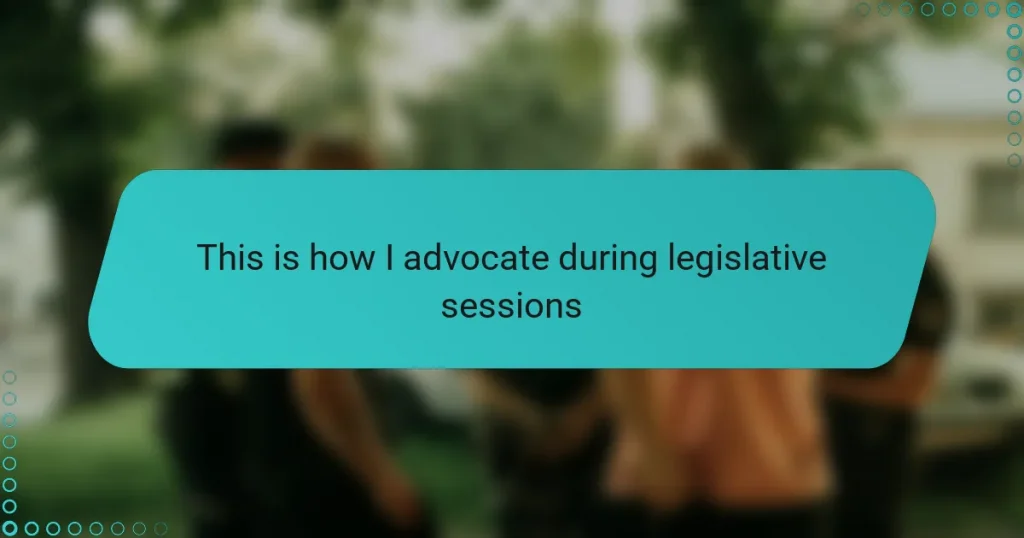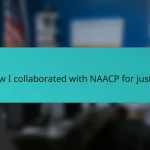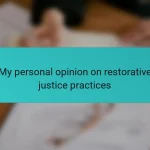Key takeaways
- Legal advocacy requires a deep understanding of ethics, justice, and effective communication with stakeholders to be impactful.
- Preparing thoroughly for legislative sessions involves analyzing proposed bills and building relationships with lawmakers through authentic engagement.
- Effective storytelling and sharing personal experiences can resonate more with lawmakers than just presenting data, making advocacy efforts more relatable.
- Building coalitions and maintaining persistence are crucial strategies for achieving successful legislative impact and overcoming setbacks.
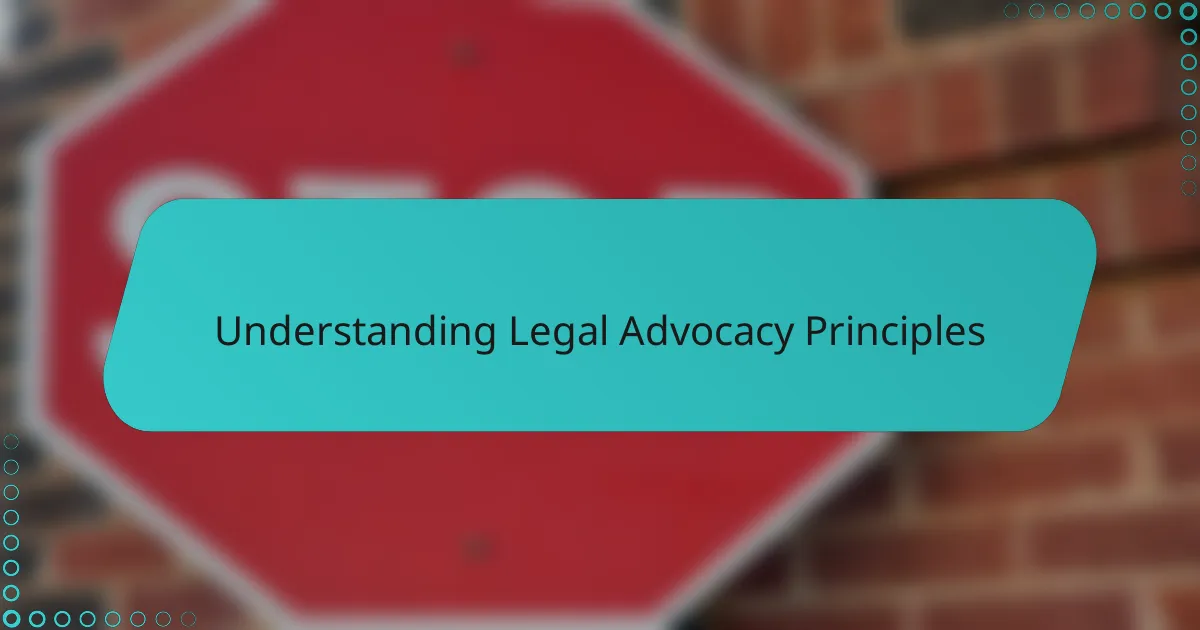
Understanding Legal Advocacy Principles
Legal advocacy, to me, goes beyond just knowing the law; it’s about embodying its spirit. Have you ever felt the frustration of seeing a rule that’s fair in theory but flawed in practice? That’s when understanding the principles behind legal advocacy—like justice, fairness, and equity—becomes crucial.
I remember my first legislative session where I realized that advocacy isn’t just arguing a point; it’s about listening deeply to all voices involved. How can you effectively champion a cause if you don’t grasp the underlying needs and concerns that shape the legal environment? This perspective has shaped how I approach every session since.
Ultimately, legal advocacy rests on the foundation of ethical responsibility. When you’re advocating, you’re not just pushing for change; you’re doing so with integrity and respect for the process. Have you considered how this mindset influences the effectiveness of your efforts? For me, it’s a constant reminder that the ‘how’ matters just as much as the ‘what.’
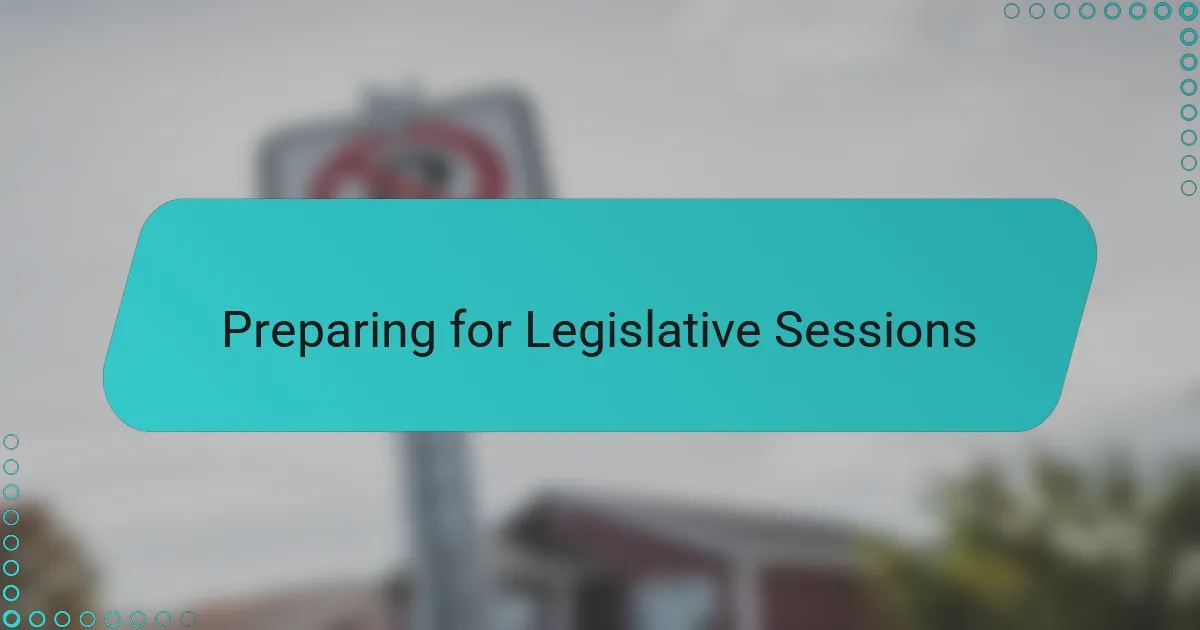
Preparing for Legislative Sessions
Preparing for legislative sessions is where the real groundwork happens. I always start by digging into the proposed bills, trying to see not just what they say but what they mean for the people affected. Have you ever found a clause in a bill that seemed harmless at first but carried hidden consequences? That’s why I take time to analyze every word carefully.
Gathering insights from stakeholders is another step I never skip. Reaching out to those who will be impacted helps me understand the stakes on a deeper level. Once, a local community member shared a perspective that completely changed how I framed my arguments—it reminded me that preparation is about more than facts; it’s about empathy.
Finally, I organize my materials thoughtfully. Notes, data, and talking points need to be at my fingertips when I’m on the floor. This might sound simple, but trust me, nothing undermines confidence like scrambling for information mid-discussion. How prepared do you feel when everything you need is right there in front of you? For me, that readiness transforms nerves into focus.
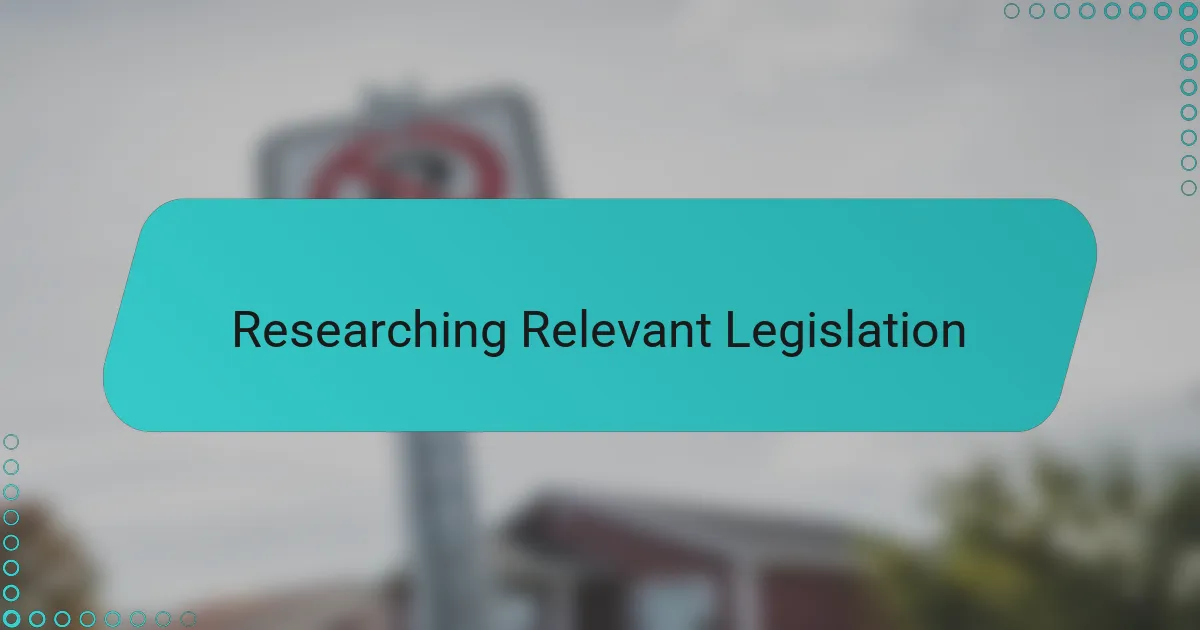
Researching Relevant Legislation
Researching relevant legislation is like piecing together a complex puzzle. I remember spending hours poring over dense legal texts, trying to connect the dots between various clauses and their real-world implications. Have you ever been surprised by how a single amendment can completely alter a bill’s impact? That’s why I stay vigilant—every detail can change the narrative.
I also make it a point to trace the history behind each piece of legislation. Understanding past debates and amendments gives me context that’s invaluable during sessions. For example, once I uncovered a recurring concern lawmakers had ignored for years, which became a powerful point in my advocacy. Don’t you think knowing the backstory helps in making compelling, informed arguments?
Finally, I dive into comparing similar laws across states or jurisdictions. This comparative analysis often sheds light on best practices or potential pitfalls that aren’t obvious at first glance. When I find a successful approach elsewhere, it boosts my confidence in proposing workable solutions. Have you ever noticed how looking beyond your immediate environment can spark new ideas? That’s exactly what thorough research does for me.
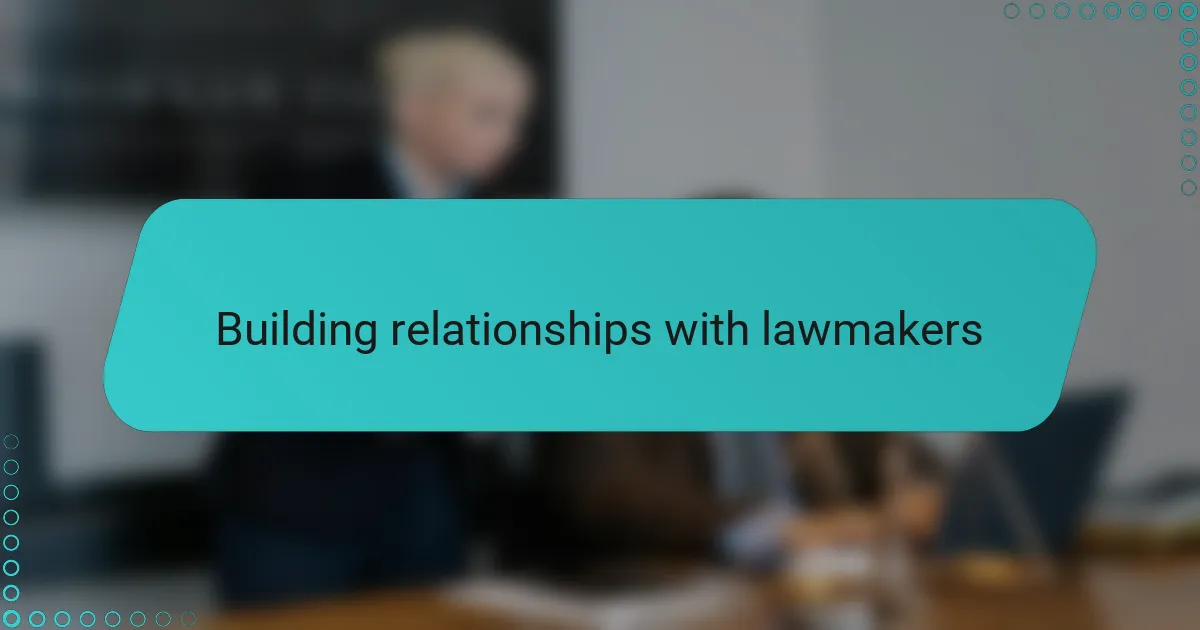
Building Relationships with Lawmakers
Building genuine relationships with lawmakers is something I consider foundational to effective advocacy. I’ve found that simply showing up with facts isn’t enough; taking the time to understand their priorities and challenges opens doors that data alone can’t. Have you ever noticed how a casual conversation over coffee can turn into a pivotal moment for collaboration?
Early in my advocacy journey, I made it a point to attend informal gatherings and committee meetings, not just to listen but to connect on a human level. These interactions revealed common ground that helped me tailor my approach in ways that felt respectful and relevant. Isn’t it surprising how much warmth and trust can grow from consistent, authentic engagement?
Over time, I’ve learned that building these relationships requires patience and genuine interest, not a checklist of favors to ask. By investing in mutual respect and open dialogue, lawmakers become partners rather than obstacles. What if we all shifted from seeing legislators as gatekeepers to seeing them as allies? That mindset has transformed how I navigate legislative sessions and, honestly, how rewarding the work feels.
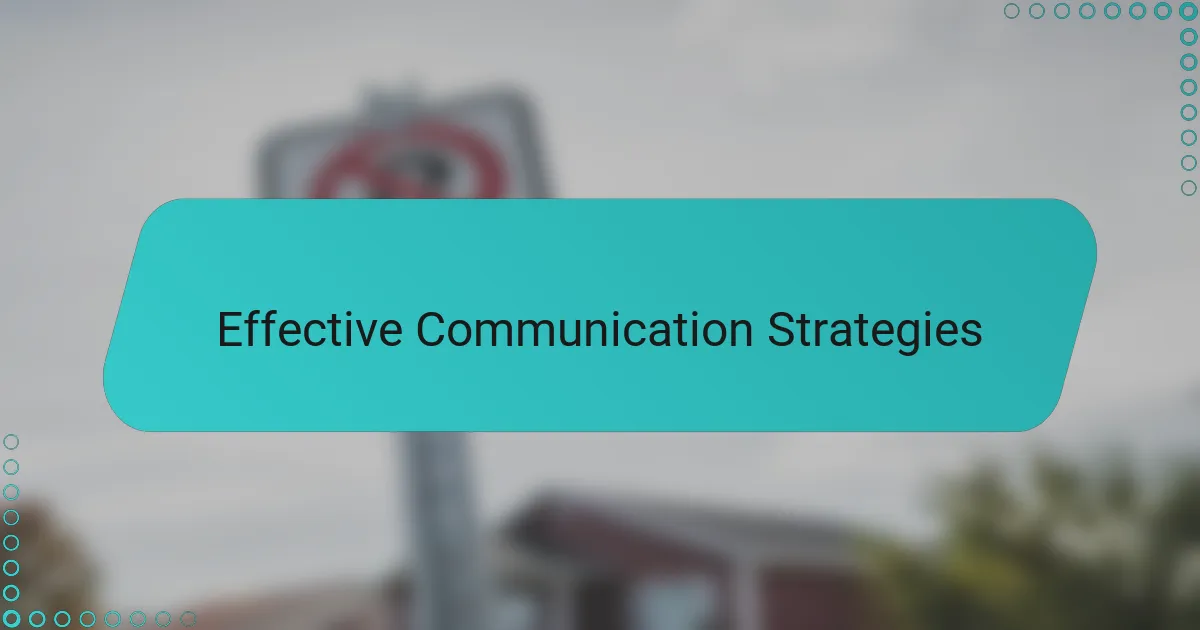
Effective Communication Strategies
Effective communication during legislative sessions hinges on clarity and empathy. I’ve often found that when I present complex legal concepts in straightforward terms, lawmakers are more receptive. Have you ever noticed how a well-framed, concise argument can open doors even when the topic is dense or controversial?
Listening is another crucial piece of the puzzle. Early in my advocacy efforts, I made the mistake of focusing too much on speaking and not enough on understanding opposing views. When I shifted to genuinely hearing concerns, I discovered common ground that helped me frame my message more persuasively. Doesn’t effective communication feel more like a dialogue than a monologue?
Tone and timing can make all the difference as well. I remember a session where a carefully timed comment, delivered respectfully, resonated far more than any passionate plea. Have you thought about how adapting your communication style to the moment can increase your influence? From my experience, mastering these nuances is what separates good advocates from great ones.
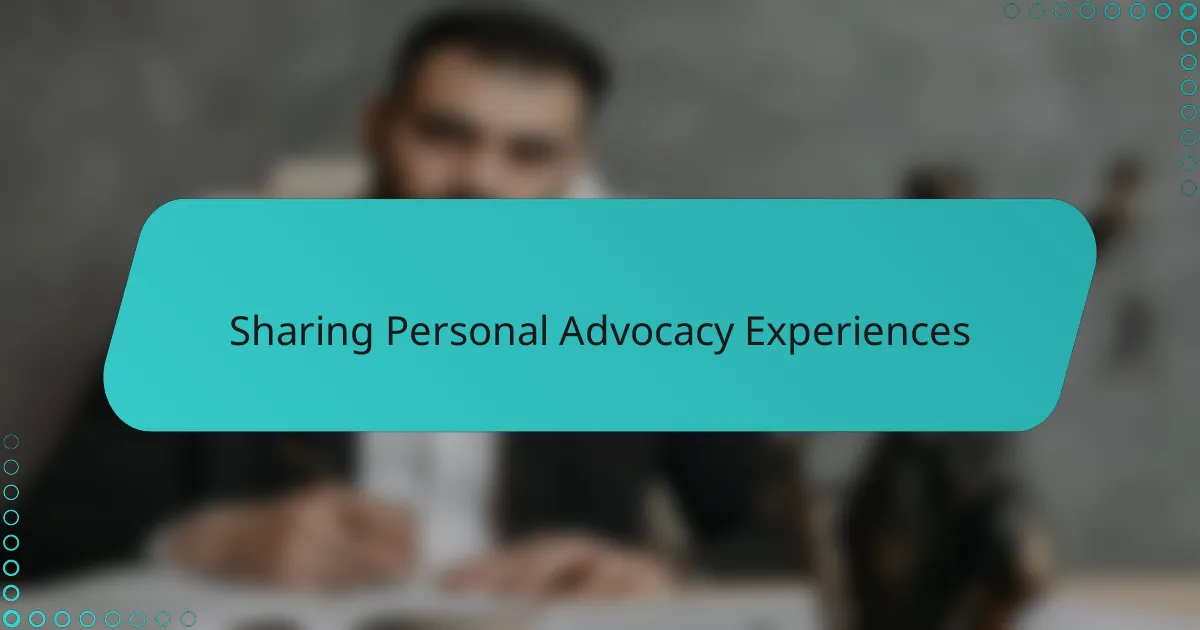
Sharing Personal Advocacy Experiences
When I share my personal advocacy experiences during legislative sessions, I often recall moments when a story made all the difference. One session, for instance, I chose to voice a constituent’s heartfelt struggle instead of just reciting statistics. Have you ever witnessed how a real-life example can suddenly shift a room’s energy? That’s when I truly understood the power of connecting emotionally, not just intellectually.
Sometimes, sharing setbacks feels just as important as celebrating wins. I remember a bill I passionately supported that initially faced strong opposition. Instead of retreating, I openly discussed the challenges and what I learned from them during a committee hearing. Have you noticed how honesty about difficulties can build credibility and invite collaboration? In my experience, vulnerability in advocacy breaks down walls rather than creating them.
Reflecting on these experiences, I realize that storytelling isn’t just about persuasion—it’s about authenticity. When I speak from the heart, lawmakers and colleagues seem to listen differently. Why? Because personal advocacy experiences humanize the issues, making them relatable and urgent. That connection, I believe, is key to advancing meaningful change.
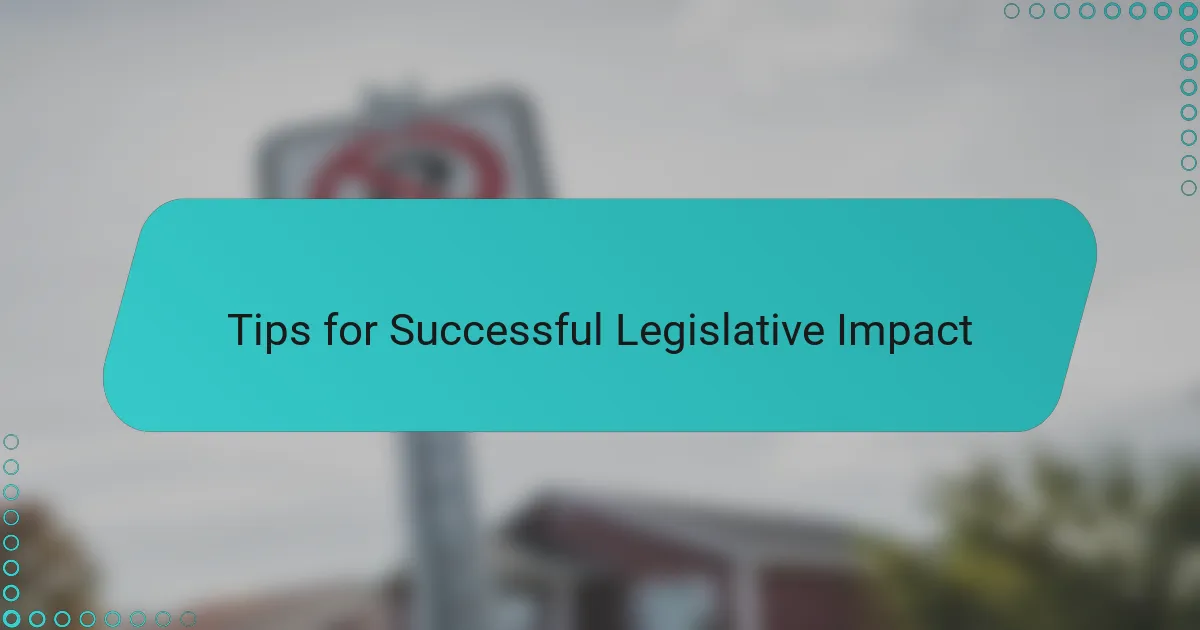
Tips for Successful Legislative Impact
One tip I’ve come to value deeply is the importance of timing your interventions. Have you ever noticed how the same point can fall flat if said at the wrong moment? I’ve learned to read the room carefully and wait for those openings where my voice can carry the most weight.
Another strategy I rely on is focusing on coalition-building rather than solo efforts. During one hectic session, joining forces with a diverse group of advocates amplified our impact far beyond what I could have achieved alone. Isn’t it fascinating how collective energy can turn individual passion into legislative momentum?
Lastly, persistence is key. I recall a bill I championed that faced multiple defeats before finally passing. It was frustrating, but each setback taught me something new and strengthened my resolve. Have you experienced how staying the course can eventually open doors you thought were firmly shut? To me, resilience in advocacy isn’t just a tactic—it’s a mindset.
